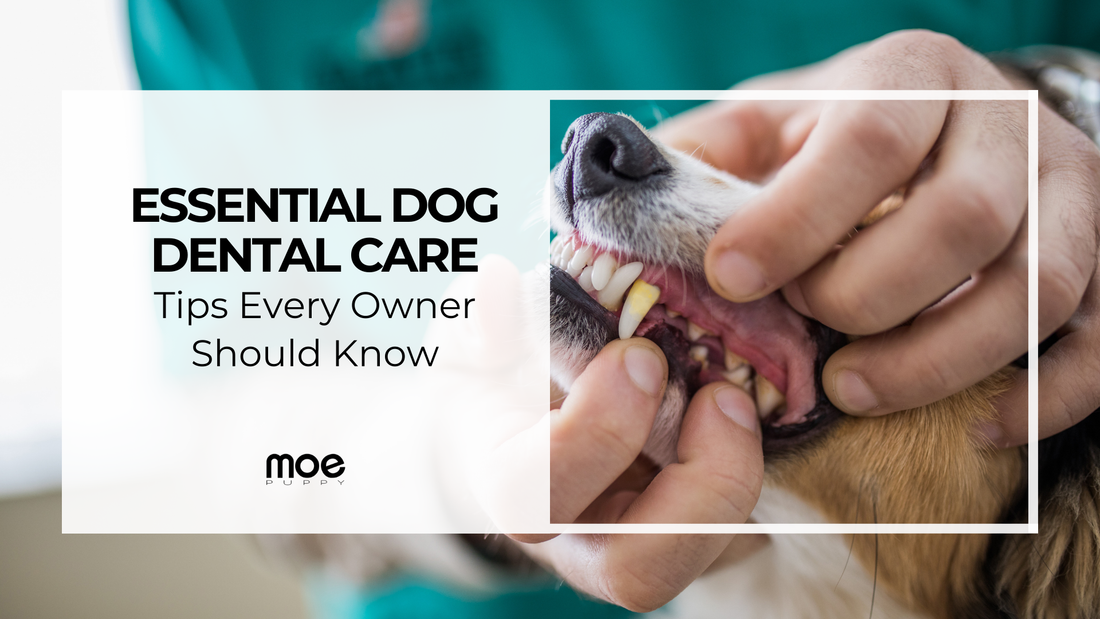
Essential Dog Dental Care Tips Every Pet Parent Should Know
Share
Good dental hygiene is crucial for your dog's overall health. Many pet owners overlook oral care, but did you know that over 80% of dogs develop some form of dental disease by the age of three? Poor dental hygiene can lead to severe health complications, from painful infections to heart and kidney disease. In this guide, we’ll explore why dog dental care is so important, the dangers of neglecting it, and how you can keep your pup’s teeth clean and healthy.
Why Dog Dental Care Matters
Your dog's mouth is a gateway to their health. If bacteria and plaque are left unchecked, they can cause painful dental diseases, bad breath, and even life-threatening infections.
Without regular care, plaque turns into tartar, which leads to gum disease, tooth loss, and even bacterial infections that can spread to vital organs like the heart, liver, and kidneys.

Consequences of Poor Dental Hygiene in Dogs
Ignoring your dog’s dental health can cause serious complications, such as:
1. Plaque and Tartar Buildup
Plaque is a sticky film of bacteria that accumulates on the teeth. If not removed, it hardens into tartar, which can only be removed by a veterinarian. Tartar buildup leads to painful gum inflammation and infections.
2. Gingivitis and Periodontal Disease
Gingivitis is an early stage of gum disease where the gums become red, swollen, and bleed easily. If untreated, it progresses into periodontal disease, which damages the gums and jawbone, leading to tooth loss and severe pain.
3. Bad Breath (Halitosis)
A foul odor from your dog’s mouth is more than just unpleasant—it’s a warning sign of bacterial infection. Persistent bad breath often indicates underlying gum disease.
4. Tooth Decay and Abscesses
Decay can weaken the teeth, causing them to crack or fall out. Bacterial infections can also create painful abscesses, leading to severe discomfort and difficulty eating.
5. Systemic Health Problems
Bacteria from an infected mouth can enter the bloodstream, affecting vital organs. Studies show that poor oral health increases the risk of heart, liver, and kidney disease in dogs.
Best Practices for Dog Dental Care
The good news is that with the right routine, you can prevent these issues and keep your dog’s mouth healthy. Here are the best practices for maintaining excellent oral hygiene for your furry friend:
1. Brush Your Dog’s Teeth Regularly
Brushing your dog’s teeth is the most effective way to prevent plaque and tartar buildup. Here’s how to do it:
-
Use a dog-specific toothbrush and toothpaste (never human toothpaste, as it contains toxic ingredients like xylitol).
-
Start slow, allowing your dog to get used to the brush.
-
Brush in gentle circular motions, focusing on the gum line.
-
Aim to brush at least 3-4 times a week, but daily brushing is ideal.
2. Use Dog Dental Sprays
Dental sprays, like the Moe Puppy Dental Spray (100ml), are an easy and effective way to reduce plaque, fight bacteria, and freshen breath. Simply spray onto your dog’s teeth and gums once or twice a day for added protection.
3. Provide Dental Chews and Toys
Chewing naturally helps clean your dog’s teeth by reducing plaque and tartar. Look for:
-
Vet-approved dog dental chews that are firm enough to scrape off plaque.
-
Rubber chew toys designed to massage the gums.
-
Rope toys that help remove food debris from between the teeth.

4. Feed a Dental-Friendly Diet
Your dog’s diet plays a significant role in their oral health. Foods that promote healthy teeth include:
-
Dry Kibble: Crunchy kibble helps scrape off plaque, while wet food tends to stick to teeth.
-
Raw Carrots & Apples: Natural abrasives that help clean teeth while providing vitamins.
-
Raw Bones (Never Cooked): Safe raw bones encourage chewing and naturally remove tartar.
-
Coconut Oil: Has antibacterial properties that reduce plaque buildup.
5. Schedule Professional Dental Cleanings
Even with regular brushing, some plaque buildup is inevitable. Veterinarians recommend professional cleanings once a year to remove stubborn tartar and check for dental issues.
6. Monitor Your Dog’s Dental Health
Check your dog’s mouth regularly for signs of trouble. If you notice bad breath, swollen gums, excessive drooling, or difficulty eating, schedule a vet visit immediately.
Final Thoughts on Dog Dental Care
Caring for your dog's teeth is about more than just fresh breath—it's essential for their overall well-being. By incorporating brushing, dental sprays like Moe Puppy Dental Spray (100ml), proper nutrition, and professional cleanings into your routine, you can help your pup live a long, healthy, and pain-free life.
Start today—your dog’s smile depends on it!

